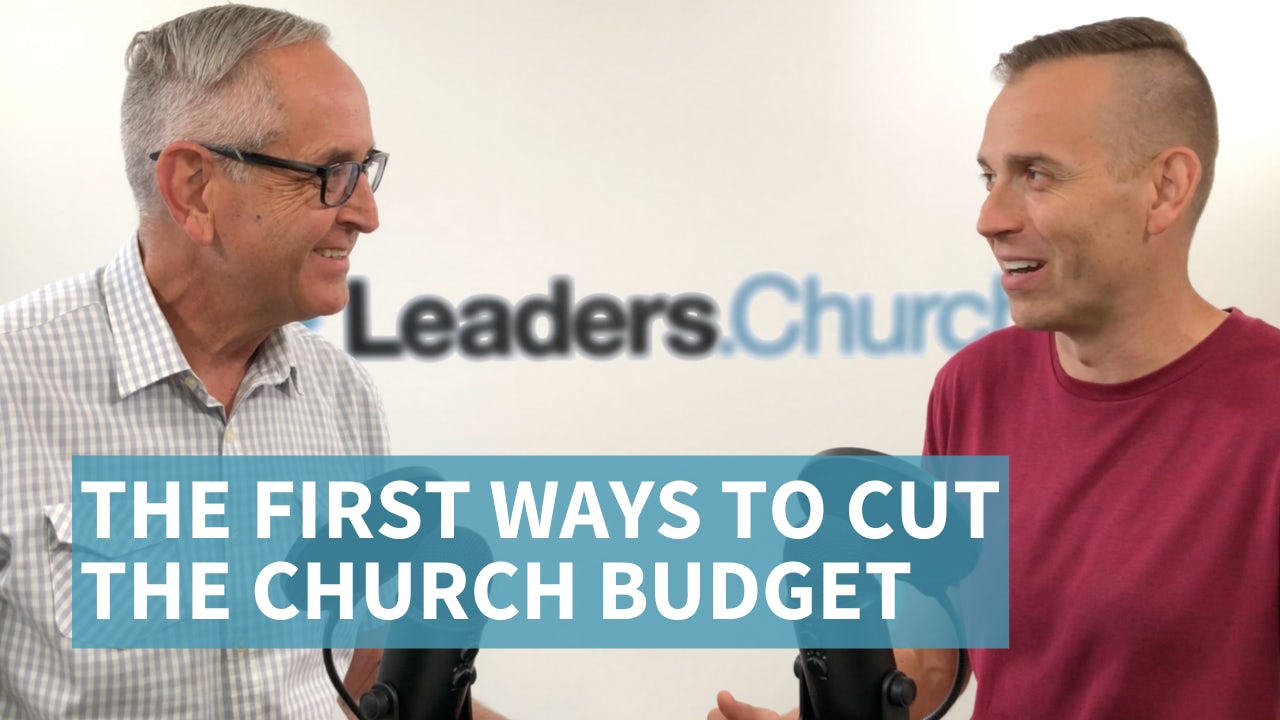027 – The First Ways to Cut the Church Budget
What’s in this Episode?
There comes a time in the life of almost every church where they need to trim back on the church budget. Maybe things pop up, maybe circumstances change, maybe giving decreases, and as a result, they need to cut the church budget. But the question is, what do you cut? Well, I have good news for you. In today’s episode, we’re going to talk about the first four places that you should cut the church budget. And when you do these things, it’s going to help you be a better steward of the resources God has given you.
Read the Transcript
Jonathan Hardy 0:25
A couple years ago, when I was serving as the administrator for our church, overseeing the church finances and budget, one of the things that I did was I talked with a couple of different banks about the merchant fees that they offered for our online giving. And one of the things that I discovered through this interaction with them is I could actually trim back and save some money if I just shop around these merchant fees. And so that’s what I did. And one of the things that was really cool about this was I was able to save a couple, I don’t Remember, the exact amount if it was $2000 or $3,000 on average, per month, simply by making a few phone calls, shopping it, telling the other bank what they’re going to do and say, well, this is what these guys are going to do, can you match it and beat it? And lo and behold, we were able to save money, trimmed it back and automated expense with just a few phone calls, a little bit of work, a little bit of paperwork, and it was a massive way just to really cut back on the overall budget. And then we could you know, if we had that income, use those dollars differently, or just spend less, and so that’s why today, we want to talk with you about the first four ways to cut the church budget, because the reality is there are times in the life of the ministry when you have to cut the budget. And as ministry leaders, we want to be good stewards, we don’t want to be just spending wastefully and oftentimes, more times than not, there’s you know, it’s not like money is just growing on trees for us. And you have something like what happened earlier this year with COVID. And all of a sudden income decreases in the church, and we have to cut everywhere. So that’s why it’s important for us to constantly be trimming back and really making sure that we’re good stewards of the church budget. Now, I want to mention here at the outset, as it relates to just balancing the budget, we talk more about how to balance the church budget in episode seven. So if you have not listened to or watched that episode, be sure to check that episode out. But for today, we’re going to talk about the four ways to cut the church budget. There’s more than four, but the first four ways that we would recommend. So Dick, why don’t you kick us off?
Tip #1: Identify Discretionary Items
Dick Hardy 2:32
Well, the very first thing you should do is identify discretionary items. Now, this gets to be tricky, because when, you know I think it’s a little bit laughable when you mentioned COVID when you know, we’re using terms like essential services. Well, what’s essential? And in the church world, what’s essential? What is discretionary? No one would view their budget as discretionary. Everyone would be like, “my budget is important no matter what my budget is,” but the reality is there are some things that you’re going to spend money on. Let’s see, like utilities, you’re not going to stop heating or cooling the building. You might turn the temperature up or down a little bit, but the reality is you’re going to spend for that. There are certain things are going to happen. Other things are things that when you look at it, you could view them that I maybe don’t have to spend all of this and it’s a bit discretionary. All of it’s important. So don’t get people in the mindset of “well, your stuff’s important, my stuff’s not important. That’s not what we’re doing here, but we’re looking for places that we can take some money out and still keep the life and the ministry sustaining and moving forward, because we don’t want to do things that are going to hurt the ministry or cut to the bone of the ministry. When you start moving discretionary spending just don’t get in the mindset where you say “I can’t do this.” Because you can. There are always places to look for small places to trim money. And that’s the very first place to start.
Jonathan Hardy 3:36
Well, and it really comes down to a prioritization of all the different ministries and all the expenses. And, like you said, it’s not like none of them are non-essential. If they’re not essential, then we shouldn’t be spending the money in the first place. So it’s not a matter of that it’s just a matter of well, we may just have to sacrifice and not spend on something else, because something different is a higher priority. And so it’s just shifting your mindset thinking in terms of priorities. And it’s like, well, you know, you start with the top priorities, you move your way down, and then it’s like, well, if we don’t have enough for the seventh, eighth, ninth priority item, well…
Dick Hardy 4:45
Then it won’t happen. And this is where you have to demonstrate leadership and be able to carry the church through.
Tip #2: Reconsolidate or Renegotiate Debt
Jonathan Hardy 4:54
Yep. Okay, the second thing that we recommend doing is to reconsolidate or renegotiate debt. So let’s talk about consolidation here for a minute. You know, maybe you’ve got some debt from different places, maybe you come and work to bring it all together to a new loan, or you get a new line of credit or something like that if you’ve got debt. Or it could be renegotiating, like I mentioned earlier with merchant fees. And so, you know, we’re negotiating with these companies that are, you know, servicing our online giving. It could be your interest rate, if you have a mortgage or some other loans, you could be negotiating the interest rate. I mean, you can do that, like you can just call the bank and and say, “hey, you know, here’s where we’re at,” especially if you’re a long standing customer, if you got a lot of history, which is why it’s important to be building these relationships. Probably ought to save that for another episode. You know, Dick, you’ve got a few ideas on that. But renegotiate debt, that’s just the bottom line.
Dick Hardy 5:57
That’s good. And the next one.
Tip #3: Defer Maintenance
Jonathan Hardy 5:58
Next one, I guess that’s me also, I should pay attention to the notes. Defer maintenance. So we talked about this in Episode 26, actually about when you have maintenance, big expenses coming. And then one of the ideas we had in that episode, go back and listen to Episode 26, if you haven’t, was to defer things. Now, we talked more about what to defer or what not to defer, how to determine what you should defer. But the idea here is you can kick the can down the road for some things, you just have to be careful about it, you have to make sure you choose the right things to kick the can down the road. But that’s a way to turn back. So maybe you were planning to refinish or reseal the parking lot and you know, make it all look nice and pretty and paint new stripes for the parking spaces. And maybe that’s one of those things where as you’re looking at the budget, you say, you know what, we need to kick the can down the road. We’re going to try to do that next year instead. That’s just an example. You have to be smart about it. But deferring maintenance is one of the things you can do. Okay now it’s your turn!
Tip #4: Trim Nickels and Dimes
Dick Hardy 6:58
Now it’s my turn! The fourth item, the last item here, is to trim nickels and dimes. Now all of us get it that nickels and dimes all add up, but frequently in budget trimming, budget cutting, we kind of go, “oh, you know, we got to look for this big thing to cut.” Well, and of course, if you can find the big thing, great. More often than not, you’re going to trim money by looking for nickels and dimes. Now obviously, it’s rhetorical in that sense, but you’re going to look for $50 in this blind item $200 there, $2,000 over here, $850 over there. And when you add it all up, then you’re gonna say, “wow, we made a dent in this.” Now probably what you need to know as a leader, you’re probably going to pretty much successfully tick a lot of ministry leaders off, because you’re going to take a little bit out of a lot of departments. And I say tick them off, as a leader, you want to help bring these others leaders, your leaders, along to understanding the importance of the strength, the fiscal strength, of the whole.
Jonathan Hardy 6:58
And why you’re doing it.
Dick Hardy 7:55
And why you’re doing it. So when their budgets trim back, little dollars, but it all adds up to a bigger amount, your leaders can get the drift of what you’re doing, but you have to pay attention to those small things added together because they make a big difference.
Jonathan Hardy 8:25
Well, and I want to just jump off of that because I know from my roles as a staff pastor, you know, when I was a staff pastor at James River, you know, all the money stuff, you don’t really have the ownership. You don’t really, I mean, as much as you try to, but you don’t fully have the weight on your shoulders. You don’t grasp it. But then, you know, then when I moved, we started a new church, Summit Park, and you know, I’m overseeing the budget and the finance, all of a sudden I had a bigger grasp of “okay, wow, we got to make sure we’re good stewards here.” And so I think it’s important. I bring that up to just simply say if you’re a staff pastor, you have to put yourself in that position of the lead pastor and the weight that they’re feeling and the financial responsibility that they feel. We don’t have silos we have to look at the church as a whole. It’s not just your ministry, not just your classes or whatever it is that your money might be having to be trimmed back from. You have to look at the whole picture. Lead pastors, I want to tell you, you have to, as Dick’s saying, you have to paint the picture you have to help them understand the whole because that’s what’s going to help them to be able to buy in and say, “okay, yeah, I get it pastor, I’m on board,” you know, and it minimizes the enemy’s work that he wants to do in creating some division and strife over money, which happens all the all the time.
Recap:
Dick Hardy 9:51
Let’s do a recap here. Four items here. Identify discretionary items, renegotiate debt or reconsolidate consolidate debt, defer maintenance is number three, and number four, trim nickels and dimes. If you’ll do these four things, you’ll be well on your way to really having the kind of fiscal strength for the church that you need, because I don’t care how big or how small your church is, there are going to be times where you’re going to need to go in the budget and do these things. And if you’ll do them right, you’ll see the Lord do good things in the future.
Jonathan Hardy 10:25
Yeah, that’s right. Hey, thank you so much for being with us today. I want to let you know of a couple of things. First of all, don’t forget the Kids Ministry Track, which is our new course for kids ministry, how to do kids ministry, we have released that and it’s available for you at a discount for the next couple of days. So you want to make sure to check that out as well. You can just go to churchuniversity.com and that’s where you can get all the information about that online course. And then also, we just want to encourage you to just subscribe whether you’re watching this on YouTube or listening on podcast, please subscribe. We want to be able to get the word out to others and I might add even rate and review if you would just help us get feedback from you on on what is helpful to you. And then as well, it helps us spread the word to those who need the same resources as you do. So, with that being said, we look forward to talking to you next time until then, be blessed.
Subscribe & Follow:
- Subscribe on Apple Podcasts
- Follow on Spotify
- Subscribe to YouTube Channel
- Subscribe on Google Podcasts
- Like us on Facebook
- Follow us on Instagram
- Follow us on Twitter
Other Resources:
- Leaders.Church
- Leaders.Church Blog
- Church University
- Take the Free 5 Day Leadership Challenge for Pastors
- Get Free Access to the 4 Secrets Masterclass









